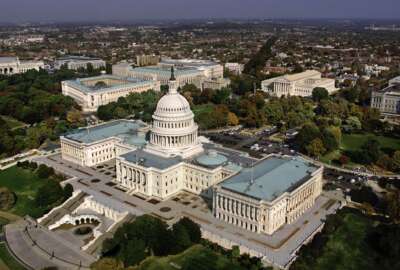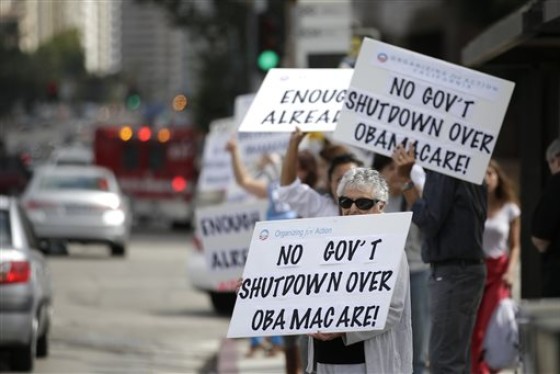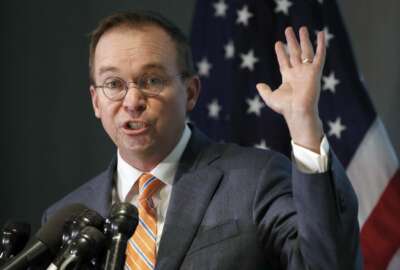
OMB: A shutdown ‘will look very different than it did’ in 2013
Though the Office of Management and Budget Friday morning said the president is "actively working to prevent a shutdown," OMB Director Mick Mulvaney said that if it...
Get the latest news about the government shutdown first. Sign up for our breaking news alerts.
Subscribe to Federal Drive’s daily audio interviews on iTunes or PodcastOne.
With less than 12 hours until government funding expires, Office of Management and Budget Director Mick Mulvaney said his agency will manage a possible shutdown differently than the previous administration.
Though he and White House Director of Legislative Affairs Marc Short said the president is calling lawmakers and is “actively working to prevent a shutdown,” OMB insisted that one under this administration will be managed differently than the 16-day lapse from 2013.
“It will look very different than it did under the previous administration,” Mulvaney told reporters Friday morning. “One of the things that I’ve learned since I’ve been in this office, there’s no other way to describe it, but the Obama administration weaponized the shutdown in 2013. What they didn’t tell you was that they did not encourage agencies to use carry-forward funds, funds that they were sitting on, nor did they encourage agencies to use transfer authority. They could have made the shutdown much less impactful, but they chose to make it worse.”
The House last night passed another continuing resolution that would extend current funding levels through Feb. 16. The Senate, however, is still debating the legislation and chances of passage appear slim.
Meanwhile, agencies are reminding their employees of their shutdown contingency plans and are preparing beyond those plans as wall.
Some agencies, under direction from OMB, are preparing to use funds from multi-year appropriations to operate past the Friday deadline.
For example, the Veterans Health Administration received advance appropriations for fiscal 2018 as part of its 2017 budget.
“So in the event of a government shutdown, VHA would continue full operations,” agency spokesman Curt Cashour said in an email. “In addition, even in the event that there is a shutdown, 95.5 percent of VA employees would come to work, and most aspects of VA’s operations would not be impacted.”
The U.S. Patent and Trademark Office said it was under similar circumstances.
“Should such a lapse occur, the USPTO would still have access to prior year fee collections, which enables the agency to continue normal operations for a few weeks,” Commerce Secretary Wilbur Ross wrote in an update to PTO employees. “USPTO employees should report to work as normal until and unless you receive notice otherwise. We are working with your Office of General Counsel and Chief Financial Officer to update our contingency plans should the USPTO need to execute an orderly shutdown of activities after that point.”
Federal News Radio has asked OMB for more clarity on this topic, as it’s unclear whether the contingency plans that agencies have posted incorporate the latest OMB directives and financial calculations that include carryover funding from the previous years.
The agency did release a new memo Friday afternoon, which reminds department and agency heads and managers of “prudent” planning for a government shutdown. OMB’s Jan. 19 memo is strikingly similar to the memo the agency sent out ahead of the 2013 shutdown.
On a Friday evening call with reporters, senior administration officers did not give specific examples where the Obama administration discouraged from using previously appropriated funds to keep key operations running.
Officials reiterated that OMB had advised agencies to “do as much as they can, consistent with the law, to keep things up and running.
“Our job is not to uncover evidence of past malfeasance, but it doesn’t take a rocket scientist to look at the barriers placed around open-air monuments on the [National] Mall, that people should and will enjoy during this shutdown,” a senior administration official said.
An Interior Department spokeswoman said while they do not expect a shutdown, “National Parks and other public lands will remain as accessible as possible while still following all applicable laws and procedures.”
The spokeswoman said roads or wilderness restrooms will remain open, but anything that requires staffing and maintenance such as campgrounds, full-service restrooms and concessions that require some park staff or assistance will not be operating.
“We are prioritizing access to the most accessible and most iconic areas of parks and public lands. Each park, monument, recreation area, etc. will have different plans in place,” the spokeswoman said.
Meanwhile, departments have been updating their contingency plans throughout Friday, which are listed on OMB’s website.
“The military will still go to work,” Mulvaney said. “They will get not paid. The border will still be patrolled. They will not get paid. Folks will be still be fighting the fires out west. They will not get paid. The parks will be open; they will not get paid. You can see the whole list. There will be a bunch of different things when you compare to 2013, but don’t lose sight of the fact that we’re asking the military to work without pay. We’re asking firefighters to work without pay.”
Contrary to Mulvaney’s statement, civilian and military employees will likely — eventually — get paid. Multiple members of Congress have introduced legislation that would guarantee back pay for federal employees in the event of a government shutdown.
Reps. Don Beyer (D-Va.) and Rob Wittman (R-Va.) reintroduced on Thursday afternoon the Federal Employee Retroactive Pay Fairness Act, which will guarantee that federal employees are taken care of.
“Federal employees should not be penalized for Congress’ inability to get its job done on time,” Wittman said in a statement. “This legislation sends a clear signal to our federal workers that they will not be harmed in the unfortunate event of a shutdown. While this legislation would minimize the impacts of funding uncertainty, my focus remains on returning Congress to a regular schedule of budgeting and passing appropriations bills.”
Sen. Ben Cardin (D-Md.) has also introduced similar legislation in the past.
Meanwhile, Rep. Ralph Norman (R-SC) has introduced a bill to ensure service members are paid in the event of a government shutdown.
Senior administration officials said the White House would support back pay for furloughed employees.
For more information on shutdown-related furloughs, visit OPM’s website.
Copyright © 2025 Federal News Network. All rights reserved. This website is not intended for users located within the European Economic Area.
Nicole Ogrysko is a reporter for Federal News Network focusing on the federal workforce and federal pay and benefits.
Follow @nogryskoWFED






